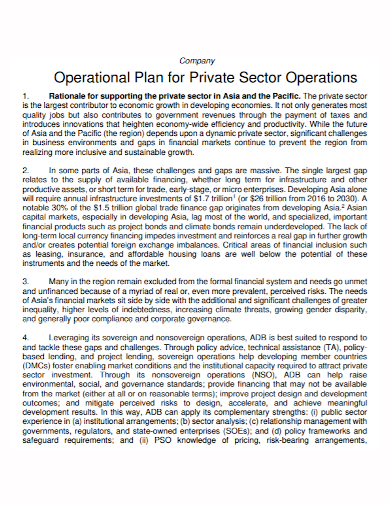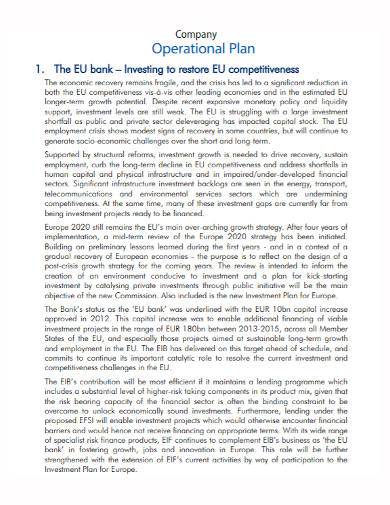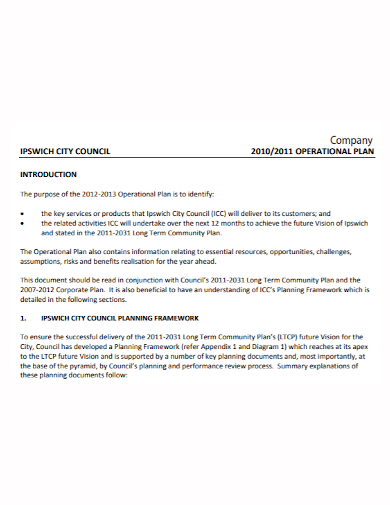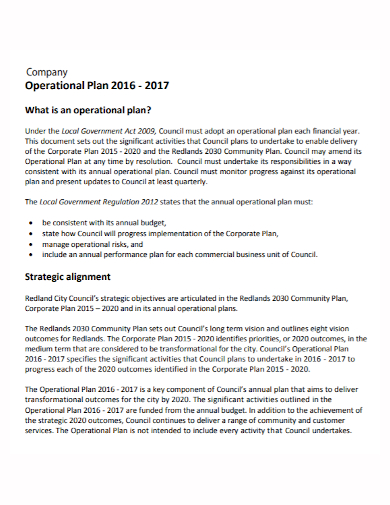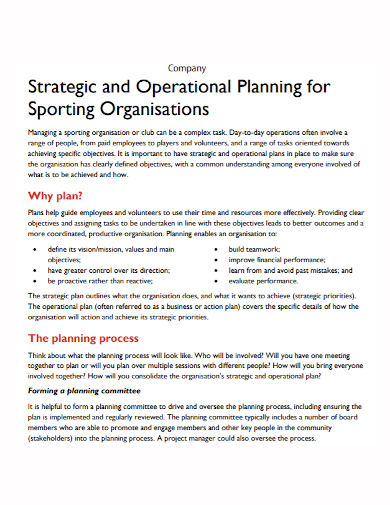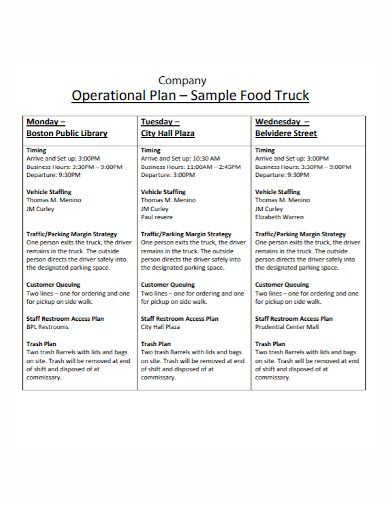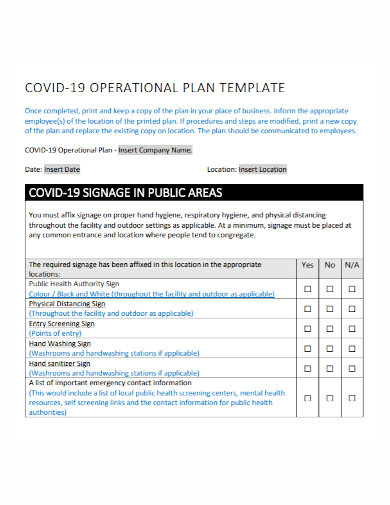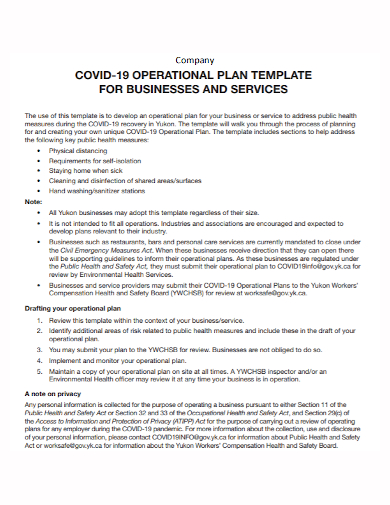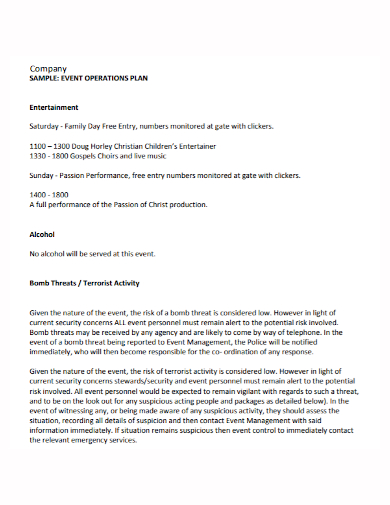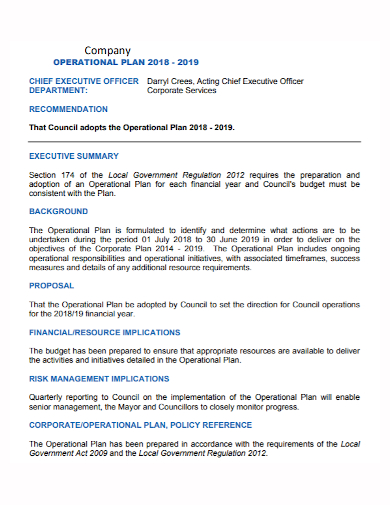Most businesses devote significant time and resources to developing strategic plans, doing their best to lay out a plan that establishes a solid long-term vision. While having a strategic plan is essential, a large number of businesses fail to include a crucial strategy component: an operating plan. An operational plan lays out the specifics of your day-to-day operations for more than a year. It specifies who is responsible for what, when they are responsible for it, and how they are responsible for it. An operation plan, when done correctly, defines how you allocate human, physical, and financial resources to achieve short-term goals that support your larger business goals.
10+ Company Operational Plan Samples
An operational plan is a strategic document that outlines all of the planning for daily operations and processes that a successful business requires. It encompasses all of the tasks that various teams or departments, such as recruitment, marketing, and finance, must complete meeting the company’s goals and objectives. The main goal of a well-defined operational plan is to ensure that each manager and employee understand their specific responsibilities and how they should be carried out within a set timeframe.
1. Company Operational Plan
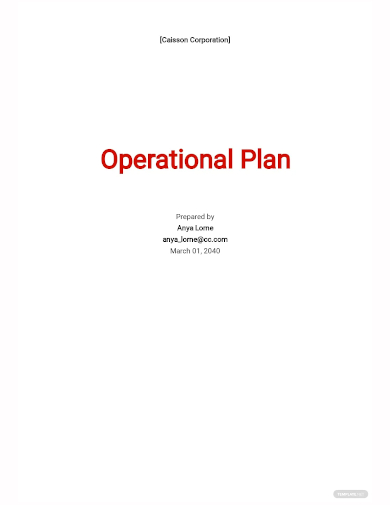
2. Private Company Operational Plan
3. Sample Company Operational Plan
4. Company Council Operational Plan
5. Company Startegic Operational Plan
6. Company Organisation Operational Plan
7. Company Food Truck Operational Plan
8. Standard Company Operational Plan
9. Company Business Operational Plan
10. Company Event Operational Plan
11. Corporate Company Operational Plan
What to Include in the Company Operational Plan?
- Goals and objectives – The key to a successful operations plan are to have a clear objective and goal that everyone is working toward. You’ll clearly state what your company’s operational objective is in this section of your plan, which is different from your company’s overall objective. Your operational goal explains how you plan to achieve your strategic goal. Operational goals will differ depending on the department. However, each department’s goal should contribute to the company’s overall goal. Furthermore, operational objectives shift; they aren’t meant to be permanent or long-term. The timeline should be planned around your company’s long-term objectives.
- Production process – After you’ve created your goals, you’ll need to consider how you’ll achieve them strategically. To do so, each department (or team) must have all of the resources required for the production process. You’ll need to describe your operating process in detail in addition to the production process. This will show investors that you know exactly how you want your company to operate daily.
- Timeline – For your new business, creating a timeline with milestones is critical. It helps to keep everyone focused and is a good way to track efficiency. If milestones aren’t being met, for example, you’ll know it’s time to rethink your production process or consider new hires.
An operational plan template should assist you in defining and improving your company’s day-to-day actions and processes. Any successful operational plan example shows that the plans cover everything your business does on a daily basis to deliver products or services to customers. They could apply to any division, department, or operation. There are numerous examples of successful operational plan implementation, particularly among large corporations. Businesses frequently create operational plans for specific processes and practices to ensure that they are meeting their goals in the areas they consider to be most important. Efficiency, turnaround time, productivity, cost savings, waste reduction, sustainability, quality, and customer satisfaction are just a few of them. A successful operating plan example can be found in any department.
FAQs
What is the importance of an operational plan?
An operation plan is a highly detailed plan that outlines how a team or department contributes to the company’s overall objectives. It lays out the day-to-day responsibilities of running a business. When properly created, an operating plan ensures that each manager and employee are aware of their specific responsibilities as well as how they should be carried out within a set timeframe. It’s critical to plan out the day-to-day tasks that will ensure a clear path to your business and operational objectives.
What is the difference between an operational plan and a strategic plan?
A strategic plan assists your company in defining long-term objectives and realizing the big picture. Operating plans specify which processes must be completed in order to meet those objectives. An operating plan complements a strategic plan by ensuring that everyone completes their daily tasks as efficiently as possible. Both are action plans, and because the strategic plan’s success is heavily dependent on the operating plan’s efficiency, you should write it right after you outline your long-term strategy.
Operational plans make your daily tasks more accountable. They assist you in analyzing your company’s performance, goals, and strategies, as well as determining the resources required to meet those objectives. These documents are also useful for tracking other performance indicators such as team efficacy, staff optimization, and the number of employees who exceed their goals.
Related Posts
FREE 3+ Sales Team Action Plan Samples in PDF | MS Word | Apple Pages | Google Docs
Marketing Plan For Small Business Samples
FREE 7+ Fashion Business Plan Samples in PDF
FREE 10+ Sprint Planning Samples In MS Word | Google Docs | PDF
FREE 10+ Wedding Planning Samples in MS Word | Apple Pages | Powerpoint | PDF
FREE 9+ Monthly Study Planner Samples in PSD | Illustrator | InDesign | PDF
FREE 9+ Sample Curriculum Planning Templates in PDF | MS Word
FREE 10+ Teacher Development Plan Samples in MS Word | Google Docs | Apple Pages | PDF
FREE 10+ Basketball Practice Plan Samples in PDF
FREE 12+ School Business Plan Samples in PDF | MS Word | Apple Pages | Google Docs
FREE 7+ Client Strategic Plan Samples in PDF | MS Word
FREE 11+ Trucking Business Plan Templates in PDF | MS Word | Google Docs | Pages
FREE 7+ Small Hotel Business Plan Samples PDF | MS Word | Apple Pages | Google Docs
FREE 14+ Bakery Business Plans in MS Word | PDF | Google Docs | Pages
FREE 4+ Yearly Lesson Plan Samples in PDF

